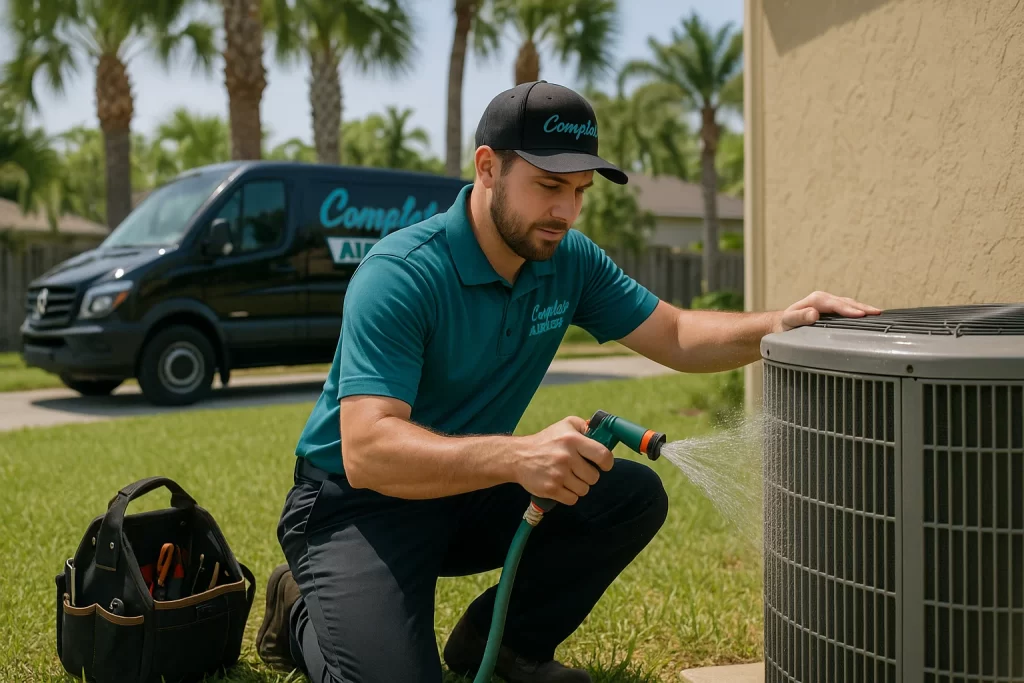Florida summers are known for intense heat and high humidity, conditions that make your air conditioner work harder than almost anywhere else in the country. With daily temperatures often soaring into the 90s and humidity levels to match, your AC system isn’t just a comfort feature; it’s a necessity. But what happens when your cooling system starts acting up during the hottest time of year?
From simple fixes to signs you need professional help, here are the most common AC problems Florida homeowners face during the summer months plus tips on troubleshooting and how you can save 20% on repairs with a USA Club Membership.

1. AC Not Turning On or Cooling Properly
DIY checkups should include:
- Thermostat batteries – Before panicking, check the batteries in your thermostat. Dead batteries can cause your system to shut off or fail to respond.
- Tripped breaker – Sometimes the issue is as simple as a tripped circuit breaker. Flip it back on and see if the system starts.
- Dirty air filter: A clogged filter restricts airflow and can cause your system to overheat or shut down. Replace your filter every 1–2 months during heavy use.
When to Call a Pro:
- If your system doesn’t turn on even after replacing batteries and checking the breaker.
- If your AC is blowing warm air despite a correct thermostat setting.
- If airflow is weak or inconsistent across different rooms.
2. AC Running Constantly
In Florida’s humid climate, it’s common for AC systems to run longer to maintain comfort. But if your system never seems to cycle off, that could be a red flag.
DIY checkups should include checking for blocked vents to make sure all supply and return vents are open and unblocked to allow proper airflow. It’s also important to set a realistic temperature. Setting your thermostat to 65°F won’t cool your house faster and may just overwork the system.
Call a pro if the unit runs non-stop and still can’t reach the desired temperature, you could have a refrigerant leak or failing compressor. Excess humidity in the home even with the AC running is another sign of malfunction.
3. Strange Noises From the AC Unit
Rattling, buzzing, grinding, or squealing sounds are never normal. They’re often your AC’s way of telling you something’s wrong.
DIY checkups should include looking for loose panels or debris. Sometimes it’s just a screw that needs tightening or a branch stuck in the outdoor unit. Call a pro if the noise persists or gets worse, you may have a failing motor, damaged fan blade, or electrical issue that needs immediate attention.
4. Frozen Coils
Frozen evaporator coils can block airflow and shut down your AC system entirely, a common issue in Florida’s humid weather when systems are overworked. DIY checkups should include:
- Turning off the AC: Let the system thaw completely.
- Replacing the air filter: Poor airflow can cause coils to freeze.
- Opening all vents: Ensure the system is getting enough return air.
Call a pro if coils freeze again after restarting the system, you likely have a more serious airflow issue or a refrigerant problem that requires professional repair.
5. Bad Odors or Musty Smell
Humidity often contributes to mold and mildew buildup in your ducts or on your AC coils. DIY checkups should include replacing filters regularly to reduce musty smells. You can also run a dehumidifier to help manage moisture levels in the home. Call one of our pros if the odor persists or smells like burning, have a technician inspect your system immediately for mold growth or electrical issues.
Making families happy on the Space Coast since 1975. Schedule an appointment with Complete Air & Heat, Inc.
